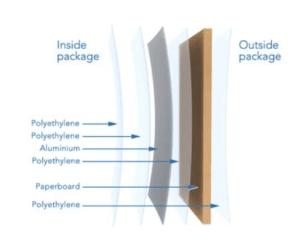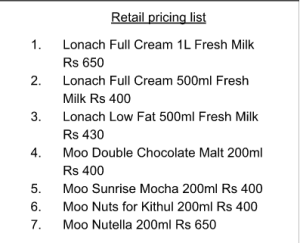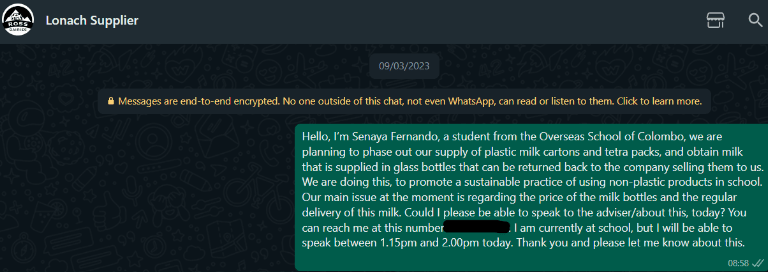During the initial stages of developing an idea for my CAS project, I knew I wanted to address a problem through CAS. After speaking with Mr Lockwood, he advised me to connect my project to my service, Eco-School, which sounded like a great idea since plenty of urgent issues or upcoming events needed planning and attention.
Ms. Lockwood during one of our Eco Committee meetings expressed how the school uses milk packaged in Tetra Paks, to meet the school’s demand for food and beverages in the café and canteen. The committee discussed for a minute the ways the school phased out from the use of Tetra Paks and transitioned into a more sustainable type of packaging; the best option we deduced was glass bottles.
I followed up with Ms. Lockwood regarding the Tetra Paks since I was very interested in helping out. I also thought of how this initiative could transform into my CAS project since I primarily wanted to address a problem through CAS.
Research of Tetra Paks
Tetra Paks may seem recyclable but in reality, they are made up of several materials: paperboard (made from wood), aluminium and several layers of polyethene (Lindsay) This makes up for a strenuous recycling process, as the layers of aluminium and polyethylene cannot be separated during recycling, remaining as a polymer (Lindsay). By phasing out the use of Tetra Paks, we would eliminate the negative externalities of consumption caused by the demand for milk packaged in Tetra Pak within our community. Lindsay)

The outside and inside of a Tetra Pak (Pic Credit- Lindsay)
Planning and Action
I spoke to Mr Rajiv, OSC’s Purchasing Officer about phasing out the school’s use of Ambewela Tetra Pak milk cartons and replacing it with bottled milk. Our school caters for almost 200 people, so before deciding to change products, we focused on the logistical sourcing aspects and cost of this change to the school. Later, I contacted Lonach Fresh Milk, a supplier of pasteurized bottled fresh milk.
- Contacting Lonach (Pic Credit- Author)
I got in touch with Imran from Lonach’s management department, who provided me with a list of the flavours, quantities and pricing of the fresh milk (refer to the list below) and pointed out that the school would be able to purchase the milk for a lower price than the retail prices given below. They had a pretty good variety of milk, which made me excited for what was to come.

The retail price of Lonach Milk (Pic Credit- Imran)
The school is currently using between 2 to 8 packets of Ambewella Milk a day. The exact number cannot be determined beforehand as the numbers will vary depending on the number of meetings and participants for each meeting or event we have at school. Fresh Milk is used at certain school offices where the Milk is been kept in the fridge after opening a packet and used for a long period. In addition to this, we are able to get a discounted price of Ambewella Milk between Rs.400 to Rs.440. Based on this information, I spoke to Imran once again to get specific logistical information which would help Mr Rajiv and me make an informed decision about Lonach’s milk.
After contacting him, I received the following details.
- Shelf life of a Lonach Fresh Milk bottle- 2 days max
- Once a bottle is opened how long can it be kept out and how long can it be kept under refrigeration- Similar to the shelf life of Ambewela milk cartons, thus, once opened it has to be refrigerated and used for max 2-3 days.
- How many cups of tea/coffee could be made using one litre of Lonach Fresh milk? Similar to the quantity we make with a one-litre Ambewela carton.
- Can they deliver between 5 to 10 bottles a day? Yes, they can deliver up to 10 bottles per day.
- If any bottles are remaining (closing expiration) will they take returns? No
- What is their policy with regard to spoiled/damaged milk? All bottles are going to be fresh, which means that the bottles that would be sent will all be filled, and packed on that day itself.
- Are we responsible for the empties? No, the school will return the empty bottles to Lonach after usage.
- What is the best price they could offer us for the one-litre Lonach Fresh Milk? Rs. 480 per litre of milk (This is including the delivery cost as well).
This information indicates how the discounted price of Ambewella Milk between Rs.400 to Rs.440 is lower than the glass bottled milk of Rs. 480 per litre we would have received from Lonach. Although we have not made a final say about Lonach being our supplier, the organization and planning that went into this initiative were immense. The help I received from Ms. Lockwood, Mr. Lockwood, Mr. Rajiv and many more people to maintain the momentum I had in constantly keeping in contact with Lonach and the logistics of this project, made me think more about the significance of perseverance and effort (LO4), particularly when committing to bring about change that positively impacts our community and environment (LO2). Although I wish I could have ended my CAS project by cementing this transition of phasing out the use of Tetra Paks in school, I believe that this project has cemented my knowledge on crucial topics such as the effects of Greenwashing and scientific knowledge on the combinations of materials that do not support recycling efforts (LO6). It developed my application of economics and environmental principles in the real world as well. Finally, this CAS project showed me that change does not come easily or quickly. I realize that Lonach is not the best option for the school to go ahead with due to the financial burden that Lonach presents us with (LO7). Thus, our main objective is to reach out to more suppliers who are willing to supply bottled milk for a lower price. Nevertheless, Ms. Lockwood, Mr. Lockwood, Mr. Rajiv and I are continuing our commitment towards this initiative.
Learning Outcomes:
LO2: Demonstrate that challenges have been undertaken, developing new skills in the process
LO4: Show commitment to and perseverance in CAS experiences
LO6: Demonstrate engagement with issues of global significance
LO7: Recognise and consider the ethics of choices and actions
Works Cited
Lindsay. “Why Tetra Paks aren’t green (even though they’re ‘recyclable’).” Treading My Own Path, treadingmyownpath.com/2014/09/11/why-tetra-paks-arent-green-even-though-theyre-recyclable/. Accessed 24 Apr. 2023.
Glomark. glomark.lk/pride-of-lonach-pasteurized-fresh-milk-1000ml/p/94215. Accessed 24 Apr. 2023. (Feature Image)


Leave a Reply